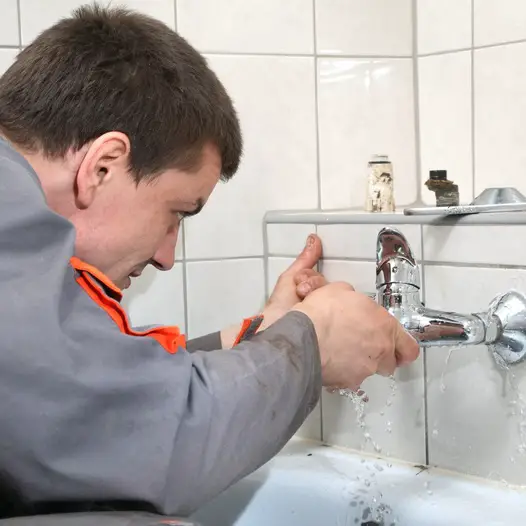Modern plumbing is remarkably resilient, but certain everyday habits can secretly wreak havoc on your pipes. Professional plumbers consistently warn about these destructive bathroom practices that could lead to expensive repairs. Understanding these common mistakes isn’t just about preventing clogs – it’s about protecting your home’s entire plumbing infrastructure.
Chemical drain cleaners corrode your pipes over time

While that bottle of drain cleaner might seem like a quick fix, it’s actually causing long-term damage to your plumbing system. Chemical cleaners create heat through chemical reactions that can weaken or corrode your pipes from the inside out.
Instead of reaching for harsh chemicals, try using a plunger or drain snake first. For mild clogs, a mixture of baking soda and vinegar can be surprisingly effective. These alternatives won’t compromise your pipe’s integrity while still keeping your drains flowing smoothly.
If you’re dealing with persistent clogs, consider calling a professional plumber. They have specialized tools and expertise to clear blockages without damaging your plumbing system.
Bath bombs and bar soaps create stubborn pipe buildup
Bath bombs might transform your tub into a spa experience, but their undissolved ingredients can wreak havoc on your pipes. The combination of oils, glitter, and flower petals creates a perfect storm for clogs.
Bar soaps are another surprising culprit. They create a scummy residue that builds up inside pipes, especially in homes with hard water. Consider switching to liquid body wash, which typically rinses away more cleanly.
If you can’t resist bath bombs, use them in a mesh bag to catch undissolved particles. This simple step can prevent future plumbing headaches while still allowing you to enjoy your relaxing soak.
Ignoring hair in shower drains leads to massive clogs

Hair is one of the most common causes of shower drain clogs, yet many people skip using a simple drain cover. When hair combines with soap scum, it creates stubborn blockages that can be difficult to remove.
Installing a mesh drain cover is an inexpensive solution that can save thousands in potential plumbing repairs. Clean the cover regularly and never push trapped hair down the drain.
For those who shave in the shower, catch hair trimmings in a separate container rather than letting them wash down the drain. This small change in habit can significantly impact your plumbing’s longevity.
Tank tablets and drop-in toilet cleaners damage components
Drop-in toilet cleaners containing bleach can deteriorate the rubber components inside your toilet tank. Over time, this leads to leaks and improper flushing.
These tablets can also break loose and get flushed down the toilet, potentially causing blockages further down the line. The continuous exposure to harsh chemicals can weaken both the tank components and the pipes themselves.
Consider using a toilet brush and bowl cleaner instead. While it requires more effort, this method preserves your toilet’s internal mechanisms and prevents potential pipe damage.
Leaving water puddles on bathroom floors causes damage

Standing water on bathroom floors isn’t just a slip hazard – it can seep into subfloors and damage underground plumbing components. This seemingly harmless habit can lead to rot, corrosion, and expensive repairs.
Use absorbent bath mats and wipe up any water immediately after showering. Ensure your bathroom has proper ventilation to reduce moisture buildup and prevent long-term damage.
Regular inspection of caulking around tubs and toilets can help identify potential water escape points before they become serious issues.
High water pressure strains pipe connections
While strong water pressure might feel luxurious, it can strain your plumbing system. Excessive pressure puts unnecessary stress on pipe joints and connections, potentially leading to leaks or bursts.
Install a water pressure gauge to monitor your home’s levels. Most plumbers recommend keeping pressure between 40 and 80 psi for optimal performance and pipe longevity.
A pressure-reducing valve can help maintain safe levels if your home’s water pressure consistently runs too high.
Flushing “flushable” products creates blockages
Despite marketing claims, many “flushable” products don’t break down like toilet paper. Items such as wipes, feminine products, and cotton swabs can accumulate in pipes, forming stubborn blockages.
The only items that should go down your toilet are human waste and toilet paper. Everything else belongs in the trash, regardless of what the product packaging claims.
Many municipalities spend millions annually clearing massive clogs caused by these supposedly flushable items. Save yourself and your community from unnecessary expense and hassle by disposing of these products properly.
Maintaining healthy pipes doesn’t require complex changes – just mindful habits. By avoiding these common mistakes, you can prevent costly repairs and ensure your plumbing system serves you reliably for years to come. Remember that prevention is always less expensive than repair, and small changes in daily habits can make a significant difference in your plumbing’s longevity.

